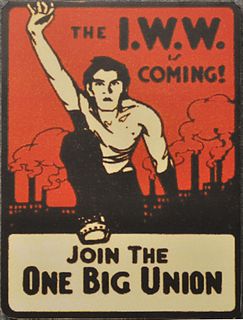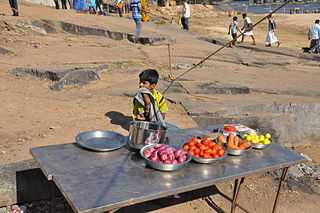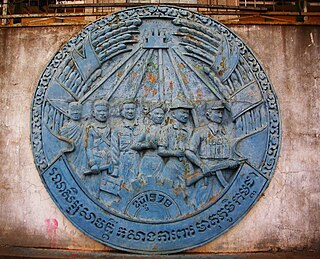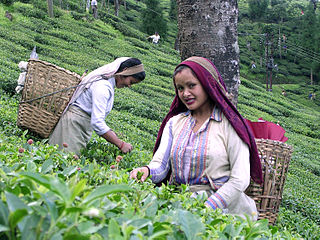Related Research Articles

The World Federation of Trade Unions (WFTU) is an international federation of trade unions established in 1945. Founded in the immediate aftermath of World War Two, the organization built on the pre-war legacy of the International Federation of Trade Unions as a single structure for trade unions world-wide. With the emergence of the Cold War in the late 1940s, the WFTU splintered, with most trade unions from the Western-aligned countries leaving and creating the International Confederation of Free Trade Unions (ICFTU) in 1949. Throughout the Cold War, membership of the WFTU was made up predominantly of trade unions from the Soviet-aligned and non-aligned countries. However, there were notable exceptions to this, such as the Yugoslav and Chinese unions, which departed following the Tito-Stalin and Sino-Soviet splits, respectively, or the French CGT and Italian CGIL unions, who were members. With the end of the Cold War and the dissolution of the Soviet Union, the WFTU lost the largest portion of its membership and financial support. Since the start of the 2000s, the organization shifted headquarters to Athens and recruited new members, claiming to have grown from representing 48 million workers in 2005 to 105 million in 2022.
Anarcho-syndicalism is a political philosophy and anarchist school of thought that views revolutionary industrial unionism or syndicalism as a method for workers in capitalist society to gain control of an economy and thus control influence in broader society. The end goal of syndicalism is to abolish the wage system, regarding it as wage slavery. Anarcho-syndicalist theory generally focuses on the labour movement. Reflecting the anarchist philosophy from which it draws its primary inspiration, anarcho-syndicalism is centred on the idea that power corrupts and that any hierarchy that cannot be ethically justified must be dismantled.

Cambodia, officially the Kingdom of Cambodia, is a country located in the southern portion of the Indochinese Peninsula in Southeast Asia, spanning an area of 181,035 square kilometres, bordered by Thailand to the northwest, Laos to the north, Vietnam to the east, and the Gulf of Thailand to the southwest. The capital and largest city is Phnom Penh.

The One Big Union was an idea in the late 19th and early 20th centuries amongst trade unionists to unite the interests of workers and offer solutions to all labour problems.

The Cambodian People's Party (CPP) is a Cambodian political party which has ruled Cambodia since 1979.

Trade Unions in India are registered and file annual returns under the Trade Union Act (1926). Statistics on Trade Unions are collected annually by the Labour Bureau of the Ministry of Labour, Government of India. As per the latest data, released for 2012, there were 16,154 trade unions which had a combined membership of 9.18 million. The Trade Union movement in India is largely divided along political lines and follows a pre-Independence pattern of overlapping interactions between political parties and unions. The net result of this type of system is debated as it has both advantages and disadvantages. According to the data submitted by various trade unions to the Ministry of Labour and Employment as part of a survey, INTUC with a combined membership of 33.3 million, has emerged as the largest trade union in India as of 2013.

The Cambodian–Vietnamese War, known in Vietnam as the Counter-offensive on the Southwestern border, and by Cambodian nationalists as the Vietnamese invasion of Cambodia, was an armed conflict between Democratic Kampuchea, controlled by the Khmer Rouge, and the Socialist Republic of Vietnam. The war began with repeated attacks by the Liberation Army of Kampuchea on the southwestern border of Vietnam, particularly the Ba Chuc massacre which resulted in the deaths of over 3,000 Vietnamese civilians. On 25 December 1978, Vietnam launched a full-scale invasion of Kampuchea, and subsequently occupied the country and removed the government of the Communist Party of Kampuchea from power.
Labour unions emerged in Japan in the second half of the Meiji period, after 1890, as the country underwent a period of rapid industrialization. Until 1945, however, the labour movement remained weak, impeded by a lack of legal rights, anti-union legislation, management-organized factory councils, and political divisions between “cooperative” and radical unionists.

The General Federation of Trade Unions of Korea is the sole legal trade union federation in North Korea. GFTUK was formed on November 30, 1945 as the General Federation of Trade Unions of North Korea. In January 1951, it was reorganized and adopted its current name. The chairman of the central committee of GFTUK is Pak In-chol.
Community is a British trade union which formed in 2004. The union represents workers in a diverse range of sectors, including iron and steel, justice and custodial, domestic appliance manufacturing, textiles and footwear, road transport, betting, the third sector, education and early years as well as the self-employed.

The term ethical trade first gained currency in the mid-1990s, where it was used as a term for socially responsible sourcing. Ethical trade addresses the ethical aspects of organisations including worker welfare, agricultural practice, natural resource conservation, and sustainability of the environment. Since then, numerous multinational organisations have adopted ethical trade policies by outsourcing to auditing companies to monitor the conditions of workers in their supply chains. The leading alliance of these companies, trade unions and non-governmental organisations is the Ethical Trading Initiative. to support business

The International Labor Rights Forum (ILRF) is a nonprofit advocacy organization headquartered in Washington, D.C., U.S., that describes itself as "an advocate for and with the working poor around the world." ILRF, formerly the "International Labor Rights Education & Research Fund", was founded in 1986, and the organization's mission statement reads: "ILRF believes that all workers have the right to a safe working environment where they are treated with dignity and respect, and where they can organize freely to defend and promote their rights and interests. ILRF works to develop practical and effective tools to assist workers in winning enforcement of protections for their basic rights, and hold labor rights violators accountable."

The People's Republic of Kampuchea (PRK) was a partially recognised state in Southeast Asia supported by Vietnam which existed from 1979 to 1989. It was founded in Cambodia by the Kampuchean United Front for National Salvation, a group of Cambodian communists who were dissatisfied with the Khmer Rouge due to its oppressive rule of Cambodia and defected from it after the overthrow of Democratic Kampuchea, Pol Pot's government. Brought about by an invasion from Vietnam, which routed the Khmer Rouge armies, it had Vietnam and the Soviet Union as its main allies.

The Kampuchea United Front for National Salvation, often simply referred to as Salvation Front or by its French acronym FUNSK, was the nucleus of a new Cambodian regime that would topple the Khmer Rouge and later establish the People's Republic of Kampuchea (PRK).

The Communist Party of Kampuchea (CPK), also known as the Khmer Communist Party, was a communist party in Cambodia. Its leader was Pol Pot and its followers were generally known as the Khmer Rouge. Originally founded in 1951, the party was split into pro-Chinese and pro-Soviet factions as a result of the Sino–Soviet split with the former being the Pol Pot faction, and the latter adopting a more revisionist approach to Marxism. As such, it claimed 30 September 1960 as its founding date, then as the Workers' Party of Kampuchea before being renamed the Communist Party in 1966.
Clothing industry or garment industry summarizes the types of trade and industry along the production and value chain of clothing and garments, starting with the textile industry, embellishment using embroidery, via the fashion industry to apparel retailers up to trade with second-hand clothes and textile recycling. The producing sectors build upon a wealth of clothing technology some of which, like the loom, the cotton gin, and the sewing machine heralded industrialization not only of the previous textile manufacturing practices. Clothing industries are also known as allied industries, fashion industries, garment industries, or soft good industries.

Export-oriented employment refers to employment in multinational corporations' international industrial factories, usually located in developing countries. Such factories produce goods and services for sale in other countries. While these multinational producers have globally expanded women's access to employment, evidence suggests they do so by reinforcing traditional gender roles or creating new gender inequalities. Such gender inequities allow multinational firms to greater exploit profits per worker than they would otherwise due to the decreased labor cost. This decrease in the cost of labor comes as a result of the relegation of women to certain occupations. Studies show that in the quest for lower unit labor costs, export-oriented facilities create poor working conditions.
The Trade Union International of Textile, Leather and Fur Workers Unions was a trade union international affiliated with the World Federation of Trade Unions.

The National Federation of Women Workers (NFWW) was a trade union in the United Kingdom of Great Britain and Ireland active in the first part of the 20th century. Instrumental in winning women workers the right to a minimum wage for the first time, the NFWW broke down barriers for women's membership in trade unions in general.
The Cambodian Alliance of Trade Unions (CATU) is a trade union federation of manufacturing workers in Cambodia. The federation was founded in 2011 and is affiliated with the Cambodian Confederation of Unions and IndustriALL Global Union.
References
- 1 2 3 The Europa World Year Book, 1989 . London: Europa Publications, 1991. p. 622
- ↑ Swann, Win. 21st-Century Cambodia . New Delhi: Global Vision Publications, 2009. p. 118
- 1 2 3 Friedrich-Ebert-Stiftung. Building unions in Cambodia
- ↑ TheAngkor. 1980 Chronology of Cambodian History Archived 2011-08-18 at the Wayback Machine
- 1 2 United States Department of State. U.S. Department of State Country Report on Human Rights Practices 1993 - Cambodia
- 1 2 International Viewpoint. Cambodia - Garment workers revolt
- ↑ National Committee for Population and Development. Speech by HE Ms. Men Sam An, Permanent Deputy Prime Minister in the opening of the 2nd National Midwifery Forum - 10-11 June 2009, Phnom Penh Hotel
- ↑ Regional Surveys of the World. Far East and Australasia 2003 . p. 262